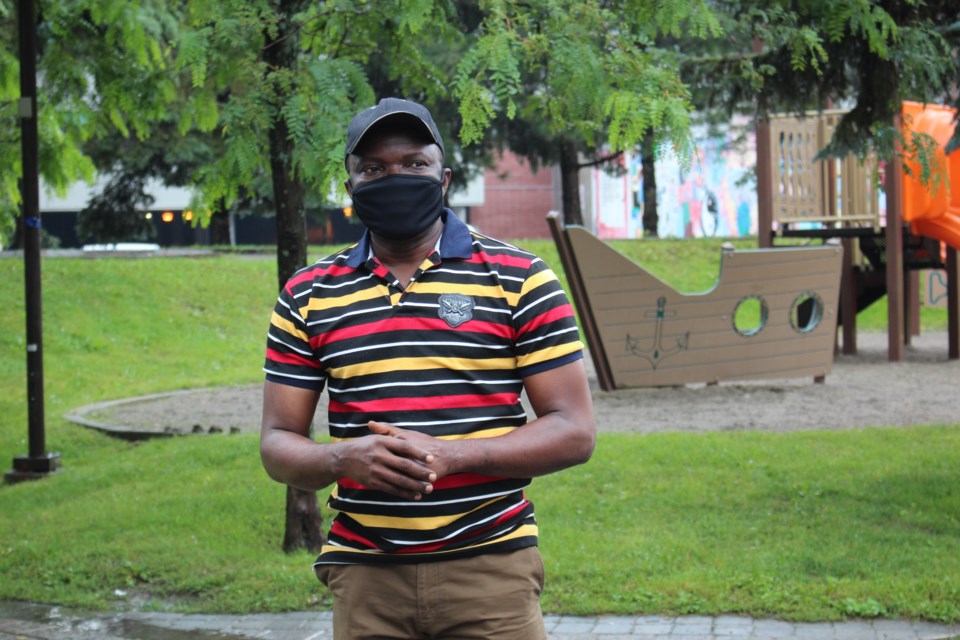Asylum seekers in the Sudbury area say the government needs to go further than its recent announcement it will provide a pathway to permanent residency for asylum claimants working in the health-care sector during the COVID-19 pandemic.
A small group gathered in Memorial Park Sunday afternoon calling for full and permanent immigration status for all asylum seekers in Canada, no matter the industry in which they work.
The local rally was one of several held across the country as part of a national day of action organized by the Migrant Rights Network.
The group says that for too long, those without permanent residency status have been unable to get universal services or speak back against bad bosses, and say COVID-19 has exacerbated the crisis.
The Migrant Rights Network says Canada needs a single-tier society where everyone in the country has the same rights and opportunities, and that means full and permanent immigration status for all.
Demands for equal status — known as "regularization" — have come to a head in recent months as COVID-19 spread throughout several farms in Ontario, highlighting the dangers the pandemic posed to migrant workers.
Hundreds of migrant workers in the province have tested positive for the virus over the past few months and three have died, said a story from Canadian Press reporting on another such rally in the Toronto area.
One of the speakers at the Sudbury rally was Lucky Ikhuebor, who came to Canada as a refugee from Nigeria in 2018 along with his wife and daughter.
Ikhuebor, who said he works as an emergency first responder and security guard in Espanola, said it isn’t just health-care workers who are on the front lines — he said he greets everyone as they enter his place of employment.
“We are here today to speak with one voice and to let our voice count on the call for status for all,” Ikhuebor said. “When the government gave this selective pathway (for health-care workers), I think it was not a fair deal because many of us are front-line in one way or another.”
Because his family does not have permanent residency status, Ikhuebor wonders what will happen when his daughter, who is 16 years old and entering Grade 12, graduates from high school and wants to go onto university.
She would be forced to pay international student fees, which are higher than those paid by students with permanent residency status or citizenship.
“I don’t have the money to pay for international fees,” said Ikhuebor, whose family still has not had a refugee hearing, nearly two years after arriving in Canada. “She’s a very ambitious girl, very intelligent. I don’t want to limit her ambition.”
He said other issues facing asylum seekers include being compelled to travel to Toronto for hearings.
Travelling to Toronto to deal with an aspect of the refugee process was sadly a factor in the deaths of three children in a car crash here in Greater Sudbury in January.
Sudbury MP Paul Lefebvre, who attended the Memorial Park rally, said that asylum hearings are actually being held online during the pandemic, one of the few positive things to come from COVID-19.
The local rally was organized by the Sudbury Workers Education and Advocacy Centre, an organization of workers, students and community volunteers committed to improving the lives and working conditions of people in low-wage and unstable employment.
“We encourage international students to come to Canada, we tell refugees and asylum seekers that Canada is a safe place to come, and yet once all of these people are here … we don’t give them the same rights that citizens and permanent residents have,” said Scott Florence, executive director of the Sudbury Workers Centre.
“We don’t give them the same access to health care that citizens and residents have. We don’t give them the same access to social support and to systems and to justice. These are human rights issues, and it’s a shame. It’s a national shame we have.”
He said in some cases, workers are tied to a single employer, and that “allows for bad bosses to exploit their workers,” because they can’t complain about illegal activity happening in the workplace for risk of getting fired and deported.
In terms of the federal government seeking to allow health-care workers permanent residency, Florence said many asylum seekers are on the front lines, even if they aren’t working in health care.
“They’ve been keeping our systems going, and they also deserve that fast-track to permanent resident status,” Florence said.
Lefebvre, who said he attended the rally to listen to people’s stories about seeking permanent residency, conceded there are “many gaps in the system.”
The MP said he is committed to working with stakeholders to address those gaps.
“Canada is a welcoming place for migrants,” he said. “We’ve raised the amount of immigrants here in Canada from around 200,000 to 400,000. But we want to do more.”
-With files from Canadian Press
